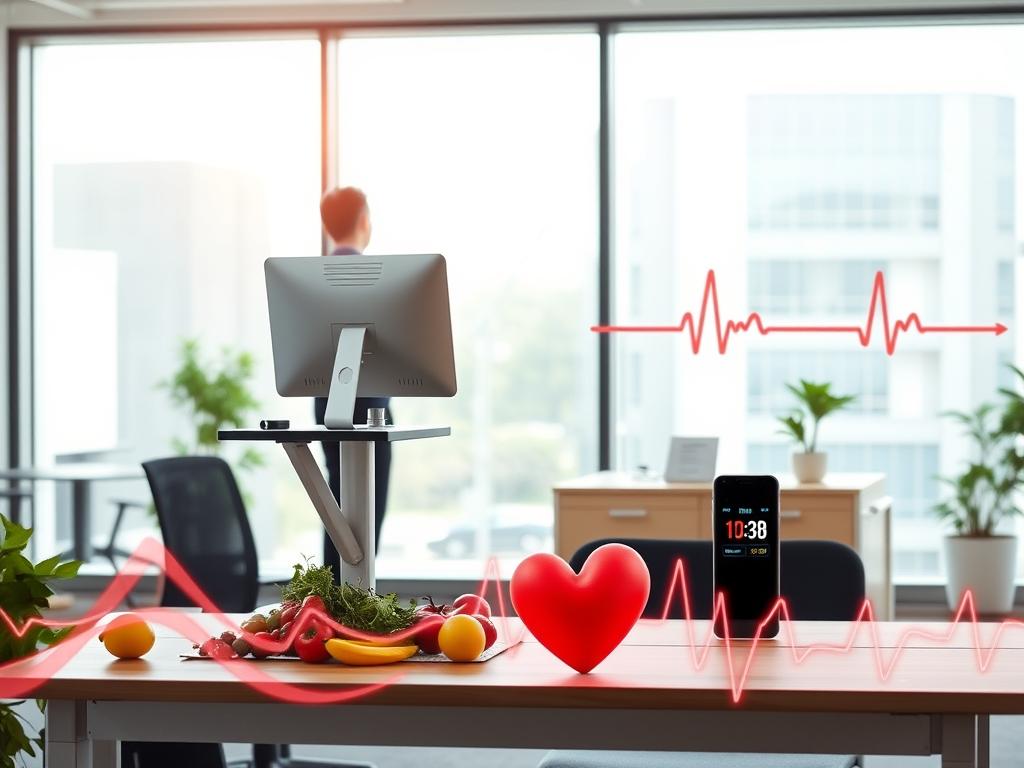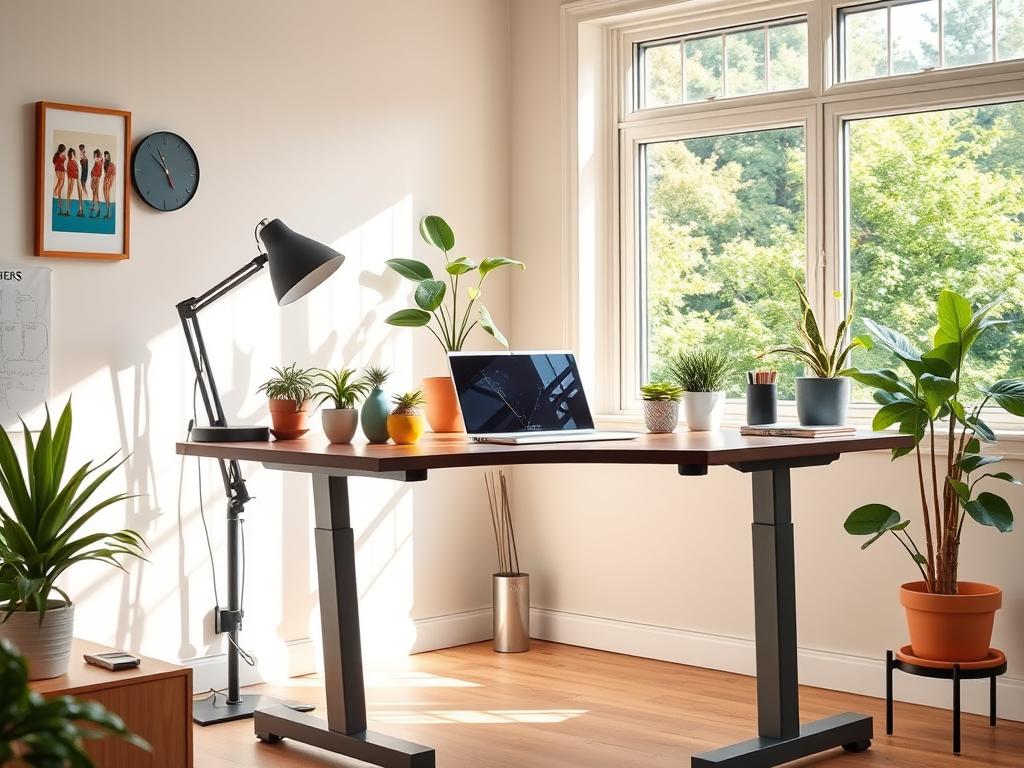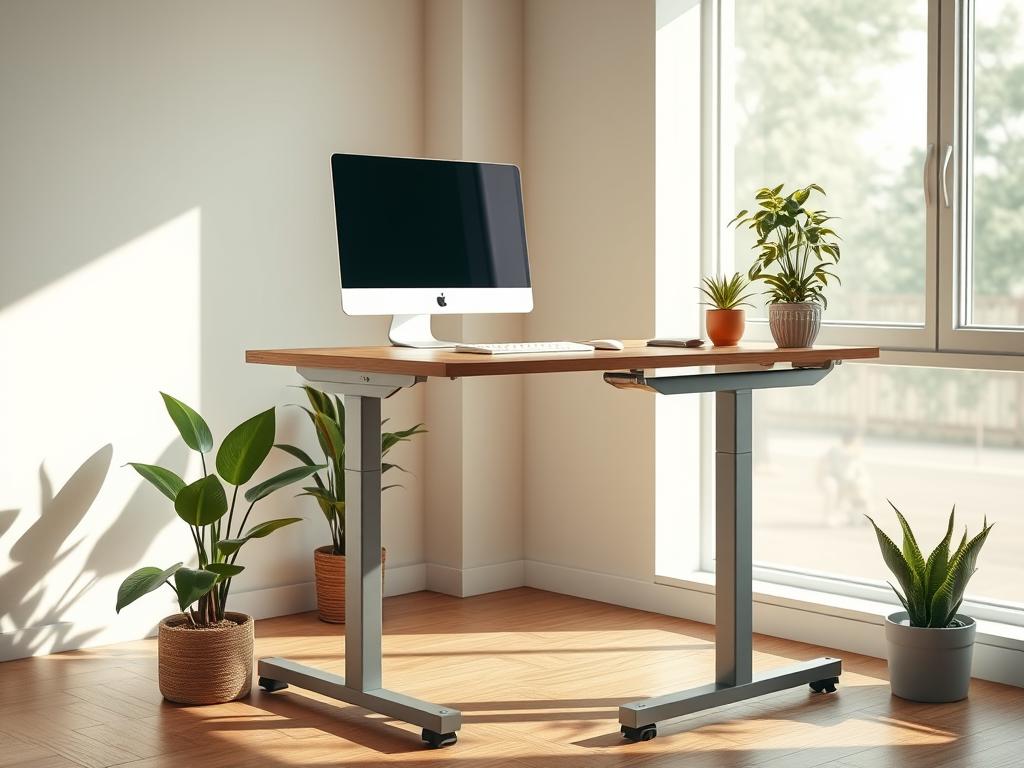I never thought a piece of furniture could change my life. But that’s what happened when I got a standing desk. I used to spend hours hunched over a desk. This took a big toll on my body and mind.
I knew the aches, fatigue, and midday slumps all too well. Standing desks aren’t just a personal win. They’re changing office wellness everywhere.
Did you know 7% more people got standing desks as a perk last year? It’s no surprise. Standing for an hour makes 66% of workers more productive and 87% more energized.
Ergonomic furniture is key for office wellness. Back pain affects 8 out of 10 people. Office workers sit for 6.5 hours daily. Standing desks help a lot.
They improve posture, reduce discomfort, and boost well-being. Standing desks can change your work life and health. They might even help you live longer. Let’s stand up for our wellness!
Understanding Adjustable Standing Desks
I’ve found that adjustable desks are a big help for office health. They let me switch between sitting and standing all day. This brings many health benefits to my desk.
What Makes a Standing Desk Adjustable
An adjustable desk can change its height. This is key for getting the most health benefits. I can easily switch from sitting to standing. This helps avoid the dangers of sitting or standing too long.
Types of Height-Adjustable Workstations
There are many adjustable desks out there:
1. Manual crank desks
2. Pneumatic desks
3. Electric adjustable desks
Each one has its own features and price. They fit different needs and budgets.
| Desk Type | Adjustment Method | Price Range |
|---|---|---|
| Manual Crank | Hand-operated crank | $200 – $500 |
| Pneumatic | Air pressure system | $400 – $800 |
| Electric | Motorized adjustment | $500 – $2000+ |
Essential Components and Features
When picking an adjustable desk, I look for these things:
1. Height range that fits me
2. Smooth and quiet adjustment
3. Strong build for stability
4. Memory presets for quick changes
5. Good cable management
Knowing about adjustable desks helps me choose the best one. The right desk can make my work better and healthier.
The Science Behind Standing While Working
I’ve looked into the science of standing at work. The results are amazing. Studies show that switching between sitting and standing can greatly improve office health. This change matches the rise of ergonomic furniture in offices.
A 1953 study found that bus drivers who stood had less heart disease than those who sat. More recent studies back this up. A 2013 study linked sitting too much to heart problems and death.
Standing desks are popular worldwide. In Sweden, Finland, and Norway, 80% of office workers use them. But in Japan, people sit for about seven hours a day, the most among 20 countries.
| Activity | Calories Burned per Hour |
|---|---|
| Sitting | 80 |
| Standing | 88 |
| Walking | 210 |
Standing does more than just burn calories. A study in the European Journal of Preventative Cardiology found that standing desk users lost 5.5 pounds a year. Standing desks also make people up to 25% more productive, improving work and mental health.
Health Benefits of Standing Desks
Standing desks are great for your health at work. They change your daily routine for the better. You’ll see big health improvements.
Cardiovascular Health Improvements
Standing desks are good for your heart. Sitting too much raises heart disease risk by 147%. Standing desks help lower this risk and boost heart health.

Blood Sugar Level Management
Keeping blood sugar in check is key. Standing for two and a half hours daily can lower blood sugar. Standing after lunch stops those energy crashes.
Back Pain Relief and Posture Enhancement
Standing desks also ease back pain. A study showed 54% of workers felt less back and neck pain by sitting less. My posture has gotten better since using a standing desk.
Calorie Burning and Weight Management
Standing desks help with weight control. Standing for three more hours a day burns up to 30,000 extra calories yearly. That’s like running 10 marathons!
| Health Aspect | Sitting | Standing |
|---|---|---|
| Cardiovascular Risk | 147% increase | Reduced risk |
| Back Pain | Common issue | 54% reduction |
| Calories Burned (3 hrs) | Baseline | Extra 170 calories |
| Blood Sugar Levels | Higher spikes | Reduced levels |
Ergonomic Considerations and Proper Setup
Standing desks are a big change in furniture. Setting up your space right is key to getting the most benefits. Here are some important tips for a great standing desk setup.
Monitor Positioning Guidelines
Putting your monitor right is very important. I place mine at eye level, about 20 inches away. This helps avoid neck pain and keeps your posture good.
A slight tilt of 10-20 degrees is also good. It keeps your view natural.
Keyboard and Mouse Placement
For easy typing, I keep my keyboard at hip level. My elbows are close to my body. This keeps my wrists at a natural 10-degree angle.
The mouse is right next to the keyboard. This makes it easy to reach.
Anti-Fatigue Mat Usage
Standing for a long time can get tiring. That’s why I use an anti-fatigue mat. It’s soft and helps my feet move a bit. This cuts down on fatigue and boosts blood flow.
| Component | Recommended Position |
|---|---|
| Monitor | Eye level, 20 inches away |
| Keyboard | Hip level, elbows close to body |
| Mouse | Next to keyboard |
| Standing Surface | Anti-fatigue mat |
Switching between sitting and standing is key. I change positions every 30-60 minutes. This keeps me comfortable and productive all day.
Productivity and Workplace Performance
I’ve seen how adjustable desks boost workplace productivity. A study from Texas A&M University found a big difference. Employees using sit-stand desks were 46% more productive than those at regular desks.
Standing desks bring health benefits and flexibility to work. They help employees stay focused by reducing breaks for sitting. Standing and moving around improves blood flow and brain activity.
Buying ergonomic furniture like adjustable desks shows employees are valued. Feeling appreciated boosts productivity. Many offices now use height-adjustable desks for a better work environment.
| Traditional Desk | Adjustable Desk |
|---|---|
| Fixed sitting position | Flexible sit-stand options |
| Limited movement | Encourages regular position changes |
| Potential for fatigue | Increased energy and focus |
| Static work environment | Promotes collaboration |
Adjustable desk users feel more energized and focused. This leads to better work performance. Adding movement to the workday improves productivity and brain function.
Mental Health and Mood Enhancement
Standing desks do more than just help your body. They also boost your mental health and mood at work. Let’s see how these desks make your office a happier place.
Stress Reduction Benefits
Standing desks are great for reducing stress. I’ve seen my stress levels drop a lot. They make me move more, which helps me stay focused and meet deadlines.
This simple change has made a big difference in my daily life.
Energy Level Improvements
Standing desks also give you more energy. Studies show they make you think clearer and feel more awake. Standing helps your blood flow better, which helps your brain work better.

Focus and Concentration Effects
Standing desks help you focus better. Standing uses different parts of your brain, making you think clearer. This helps you be more creative and solve problems better.
Standing also makes you stand up straight, which boosts your confidence. This makes you do better at work.
Standing desks make work a better place. They help offices focus on both body and mind health. This leads to happier, more productive employees.
Implementing Standing Desks in the Workplace
Standing desks really change office wellness. To add them to your office, you need a good plan. Let’s look at some important steps for a smooth change.
Transition Strategies
Begin slowly with standing desks. Start with 15-30 minute standing breaks. This helps your body get used to it.
A study showed people with adjustable desks sat 17% less after three months. This effect lasted a year.
Employee Training Tips
Teaching staff how to use standing desks is key. Show them how to set up their desk right. This includes monitor height, keyboard placement, and posture tips.
Good training makes a big difference. 88% of users found standing desks easy to use after a year.
Creating an Active Workspace Culture
Make sure to move around during the day. Offer both sitting and standing options. Some offices use desk booking software to manage shared standing desks well.
The results are clear. 65% of standing desk users felt more energetic and productive after a year.
| Benefit | Percentage of Users Reporting |
|---|---|
| Reduced upper body discomfort | 47% |
| Increased productivity | 65% |
| Positive impact on health outside work | 65% |
Cost Considerations and ROI
I’ve looked into the money side of adding adjustable desks at work. At first, it might seem expensive. But the long-term gains are big. A study showed companies can save about £1,770 per worker thanks to better productivity from ergonomic furniture.
The price of an adjustable desk changes a lot. Simple ones start at $200, and fancy ones can cost over $2,000. I think about things like how long it lasts, how much it can hold, and how fast it adjusts. These things matter for how well it works and lasts, which affects the return on investment.
Buying adjustable desks can cut down on presenteeism costs a lot. In the UK, these costs are about £30 billion a year. That’s more than twice the cost of when workers are absent. Adjustable desks help make work more comfortable and reduce distractions, which helps fight this problem.
| Cost Factor | Value |
|---|---|
| Average intervention cost per employee | £692.40 |
| Net savings per employee | £1,770.32 |
| Presenteeism costs in UK | £30 billion |
To figure out ROI, I look at lower healthcare costs, more productivity, and happier workers. Even though ergonomic furniture costs a lot upfront, the long-term savings and benefits are worth it for any company looking ahead.
Conclusion
I’ve looked into the great benefits of standing desks for office health. Studies show they really help. People using these desks sat 17% less after three months. And this change lasted a whole year!
Standing desks do more than just reduce sitting. Almost half of users felt less pain in their upper body. An amazing 88% found them easy to use after a year. Plus, 65% felt more productive and focused.
These desks also made users feel more awake and full of energy. These good feelings even carried over into their personal lives.
Standing desks aren’t just for grown-ups. Kids in school also see big benefits. They sat less during lessons and breaks. This is key since only one-fifth of German kids get enough exercise.
In short, standing desks are a big win for office health. They improve health, mood, and work performance. As we learn more, I expect to see them everywhere in offices that care about their employees’ well-being.
FAQ
What are the main benefits of using an adjustable standing desk?
How long should I stand at my adjustable desk each day?
Are standing desks really worth the investment?
How do I set up my standing desk ergonomically?
Can standing desks help with weight loss?
How do standing desks impact productivity?
Are there any risks or downsides to using a standing desk?
How can I encourage my company to implement standing desks?
Source Links
- https://www.ohow.com/2021/02/08/standing-desk-ergonomics-7-benefits-of-standing-at-work/ – Standing Desk Ergonomics: 7 Benefits of Standing at Work – Orthopaedic Hospital of Wisconsin
- https://www.workspaceinteriorsod.com/blog/benefits-of-height-adjustable-desks/ – Benefits of Height-Adjustable Desks
- https://abcnews.go.com/Shop/expert-advice-standing-desks/story?id=107481829 – Expert advice on standing desks: Should you try one?
- https://www.bondcollective.com/blog/standing-desk/ – Standing Desks: The Benefits And Risks Of Standing At Work – Bond Collective
- https://www.office.eco/blog/the-science-behind-standing-desks – The Science Behind Standing Desks
- https://pmc.ncbi.nlm.nih.gov/articles/PMC8582919/ – Effects of a Workplace Sit–Stand Desk Intervention on Health and Productivity
- https://www.webmd.com/fitness-exercise/standing-desks-help-beat-inactivity – Health Benefits of Standing Desks
- https://www.timotion.com/en/news-and-articles/health-benefits-of-sit-stand-desks – Health benefits of standing/height-adjustable desks – TiMOTION
- https://www.chairoffice.co.uk/blog/8-incredible-benefits-of-standing-desks/ – 8 Incredible Benefits of Standing Desks
- https://www.ccohs.ca/oshanswers/ergonomics/office/sit_stand_desk.html – Office Ergonomics – Sit/Stand Desk
- https://www.startstanding.org/proper-workplace-ergonomics/ – Guide to Proper Sitting and Standing Desk Ergonomics – Start Standing
- https://www.uclahealth.org/safety/ergonomics/office-ergonomics/sitting-standing-workstations – Sitting to Standing Workstations
- https://techehs.com/blog/do-standing-desks-actually-increase-productivity – Do Standing Desks Actually Increase Productivity? – TECH EHS Solution
- https://www.yourworkspace.com/blog/sit-stand-desks-a-revolution-in-workplace-health-and-productivity/ – Sit-stand Desks: A Revolution in Workplace Health and Productivity – Your Workspace
- https://loctekmotion.com/blogs/Ergonomic Design/Does Standing in front of a Desk Improve Your Mental Health – Does Standing in front of a Desk Improve Your Mental Health
- https://www.flexispot.au/spine-care-center/is-it-true-that-standing-at-a-desk-improves-your-mental-health?srsltid=AfmBOoqAHkHqDww3fyk8C1r6T1GOrNwTtdmXfnw8Q08k6OzWamHJNn_X – Does Standing at a Desk Improve Your Mental Health? | FlexiSpot
- https://www.autonomous.ai/ourblog/psychological-benefits-of-a-standing-desk – What Are the Psychological Benefits of a Standing Desk?
- https://www.steelcase.com/research/articles/topics/wellbeing/year-long-study-reinforces-benefits-standing-desks/ – Standing Desk Research Reinforces Benefits of Standing
- https://www.excelcampus.com/tips/standing-desks/ – My Journey with Standing Desks – Excel Campus
- https://www.ncbi.nlm.nih.gov/pmc/articles/PMC7068419/ – A Cost and Cost-Benefit Analysis of the Stand More AT Work (SMArT Work) Intervention
- https://www.red-thread.com/blog/ten-considerations-when-choosing-a-sit-stand-desk/ – 10 Considerations when choosing sit-stand desks for the office.
- https://www.barefieldandcompany.com/blog/standing-desk-research-reinforces-benefits-of-standing/ – Standing Desk Research Reinforces Benefits of Standing – Workplace Solutions
- https://www.ncbi.nlm.nih.gov/pmc/articles/PMC7434830/ – Effects of Installing Height-Adjustable Standing Desks on Daily and Domain-Specific Duration of Standing, Sitting, and Stepping in 3rd Grade Primary School Children
- https://www.posturite.co.uk/blog/the-benefits-of-using-standing-desks-latest-research?srsltid=AfmBOorVg8b59me5ZzC4yA4THxCy-t8vRaXT_kYETwwWzBU6U8xcmRXz – The benefits of using ‘standing desks’: what’s the latest research?
